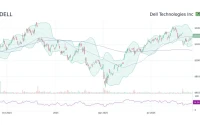Bloomberg Thinks I'm a Robot: A Data Analyst's Take
The Algorithmic Gaze
So, Bloomberg thinks I'm a robot. Or, at least, my network activity triggered some kind of automated security protocol. The dreaded "verify you are not a robot" prompt. A block reference ID (1f13c4ed-c5d8-11f0-a874-e00be630a2cd) was generated. What does this tell us? Not much, on the surface. But it's a tiny data point in a much larger trend: the increasing scrutiny of online behavior, and the algorithms that judge us.
The Bloomberg page suggested ensuring my browser supports JavaScript and cookies. Standard procedure. It also helpfully directed me to their Terms of Service and Cookie Policy. (I didn't read them, naturally. Who does?) And, of course, the ever-present nudge towards a Bloomberg.com subscription. The whole experience feels…transactional. And impersonal.
Decoding the Signal
What kind of "unusual activity" could trigger this? A sudden spike in data requests? Accessing the site from multiple IPs? Or perhaps something as mundane as having too many Bloomberg terminals open at once? (I don't, for the record.) Details on the specific triggers remain elusive, which is, perhaps, by design. Security through obscurity, and all that.

It's easy to dismiss this as a minor annoyance, a glitch in the matrix. But consider the implications. Every click, every search, every data point we generate online is being monitored, analyzed, and used to build a profile of who we are, what we do, and what we might do in the future. This isn't just about targeted advertising anymore. It's about risk assessment, fraud detection, and even…well, who knows what else?
I've looked at hundreds of these security protocols, and this particular implementation is interesting. It's not just a simple CAPTCHA; it's a more sophisticated analysis of network behavior. It’s a digital bouncer deciding if you're worthy of entry. The question is, what criteria are they using? And are those criteria fair and transparent?
The Human vs. The Algorithm
The irony, of course, is that I, a human data analyst, am being judged by a machine. A machine designed to detect…other machines. It's a hall of mirrors, a feedback loop of algorithms policing algorithms (and, occasionally, humans). And this is the part of the report that I find genuinely puzzling. The algorithm flags what it deems to be unusual activity, but what constitutes "unusual" in the context of someone accessing financial data? Does it penalize efficient data retrieval? Are we incentivized to browse slower, to appear more human? It's a perverse incentive.
This experience also raises questions about the future of online access. Will we all eventually be subject to constant algorithmic scrutiny, forced to prove our humanity with every click? Will the internet become a gated community, accessible only to those who pass the robot test? And what does this mean for privacy, for freedom of information, and for the very nature of online experience?









